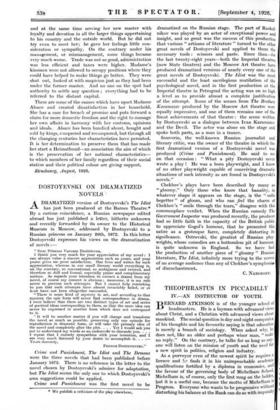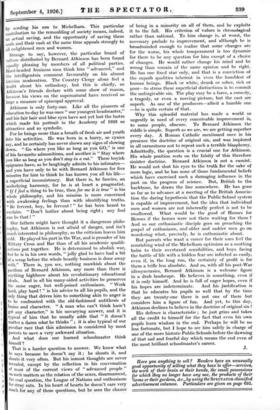B ERNARD ATKINSON is of the younger school of headmasters. He
is a layman with advanced views about Christ, and a Christian with advanced views about mankind. The social question is day and night companicn of his thoughts and his favourite saying is that education is merely a branch of sociology. When asked why, he does not, like an older and perhaps wiser man, " make no reply." On the contrary, he talks for as long as anY - one will listen on the mission of youth and the need for a new spirit in politics, religion and industry.
As a purveyor even of the newest spirit he requires a licence and he finds it in his unimpeachable academic qualifications fortified by a diploma in economics, and the favour of the governing body of Michelharn School. Michelham is, of course, only the first rung on the ladder, but it is a useful one, because the motto of Michelham IS Progress. Everyone who wants to be progressive without disturbing his balance at the Bank can do so with inopunitY by sending his son to Michelham. This particular contribution to the remoulding of society means, indeed, an actual saving, and the opportunity of saving these souls and their cash at the same time appeals strongly to all enlightened men and women.
Strange to say, however, the particular brand of culture distributed by Bernard Atkinson has been found equally pleasing by members of all political parties. hard-headed business men think him "advanced," and the intelligentsia comment favourably on his almost Grecian moderation. The Country Clergy alone feel a doubt about his orthodoxy, but this is chiefly, so Atkinson's friends declare with some show of reason, because his views on the supernatural have received so large a measure of episcopal approval.
Atkinson is only forty-one. Like all the pioneers of education to-day he was once" our youngest headmaster," and his fair hair and blue eyes have not yet lost the lustre which made his portrait in the Academy of 1923 so attractive and so symbolic.
For he brings more than a breath of fresh air and youth into his activities. He was born in a hurry, so cynics say, and he certainly has never shown any signs of slowing down. "Go where you like as long as you GO," is one of his favourite admonitions, and another is "Stay where you like as long as you don't stay in a rut." These boyish epigrams have, as he laughingly admits to his intimates— and you have only to be with Bernard Atkinson for five minutes for him to think he has known you all his life— a superficial inconsistency. But there is, he fancies, an underlying harmony, for he is at heart a pragmatist. "If I feel a thing to be true, then for me it is true" is his whole philosophy, and his mission is more concerned with awakening feelings than with identifying truths.
"Be fervent, boy, be fervent ! " he his been heard to exclaim. "Don't bother about being right ; any fool can be that ! "
Our fathers might have thought it a dangerous philo- sophy, but Atkinson is not afraid of danger, and isn't much interested in philosophy, so the criticism leaves him cold. He played his part in the War, and is prouder of his Military Cross and Bar than of all his academic qualifi- cations put together. He is determined to abolish war, but he is in his own words, "jolly glad to have had a bit of a scrap before the whole beastly business is done away with." There is, ypu see, nothing mawkish about the pacifism of Bernard Atkinson, any more than there is anything highbrow about his revolutionary educational ideals. And in all his many-sided activities he preserves the same eager, but well-poised enthusiasm. "Work hard, play hard ! " is his advice to all his pupils, and the only thing that drives him to something akin to anger is to be confronted with the old-fashioned antithesis of brains and character. "A man who can't think hasn't got any character," is his unvarying answer, and it is typical of him that he usually adds that "it doesn't matter a damn what_ he thinks " ; it is also typical of our Peculiar race that this admission is considered by most Parents to save a very awkward situation.
And what does our learned schoolmaster think himself?
That is a harder question to answer. We know what he says because he doesn't say it ; he shouts it, and shouts it very often. But his inmost thoughts are never revealed, except by the reflection in his conversation of most of the current views of "advanced people" on such matters as the relation of the sexes, disarmament, the coal question, the League of Nations and enthusiasm for stray cats. In his heart of hearts he doesn't care very flinch for any of these questions, but he sees the chance• of being in a minority on all of them, and he exploits it to the full. His criterion of values is chronological rather than rational. To him change is, at worst, the necessary prelude to improvement, and although he is broadminded enough to realize that some changes arc for the worse, his whole temperament is too dynamic for there to be any question for him except of a choice of changes. He would rather change his mind and be wrong than remain of the same opinion and be right. He has one fixed star only, and that is a conviction of the superb qualities inherent in even the humblest of human beings. Black or white, drunk or sober, rich of poor—to stress these superficial distinctions is to commit the unforgivable sin. The play may be a farce, a comedy, a tragedy, or even a moving picture, but the cast are superb. As one of the producers—albeit a humble one —he is quite certain of that.
Why this splendid material has made a world so urgently in need of every conceivable improvement is, to some people, obscure. To Bernard Atkinson the riddle is simple. Superb as we are, we are getting superber every day. A Roman Catholic mentioned once in his presence the doctrine of original sin, and was implored in all earnestness not to repeat such a terrible blasphemy. Admittedly, the question is a crucial. one for Atkinson. His whole position rests on the falsity of this therefore sinister doctrine. Bernard Atkinson is not a casuist. He would not shut his eyes to the truth for the saki of mere logic, and he has none of those fundamental beliefs which have exercised such a damaging influence in the past on the progress of science. But, British to the backbone, he draws the line somewhere. He has gone so far as to advance at a meeting of the British Associa- tion the daring hypothesis that the Public School system is capable of improvement, but the idea that individual men and women are not inherently perfect is not to be swallowed. What would be the good of Houses for Heroes if the heroes were not there waiting for them ? And so our enthusiastic disciple goes on preaching the gospel of enthusiasm, and older and sadder men go on wondering what, precisely, he is enthusiastic about.
But parents who want a career for their sons feel the nourishing wind of the Michelham optimism as a soothing balm to their overtaxed sensibilities, and boys facing the battle of life with a hidden fear arc infected as easily, even if, in the long run, the certainty of profit is for them a trifle less absolute. And so, with all his post-War idiosyncrasies, Bernard Atkinson is a welcome figure in a drab landscape. He believes in something, even if it is only himself. And he is full of eager hopes, even if his hopes are indeterminate. And his justification is that he educates his pupils so well that by the time they are twenty-one there is not one of them but considers him a figure of fun. And yet, to this day, Atkinson declines to believe in the doctrine of original sin !
His defence is characteristic ; he just grins and takes all the credit to himself for the fact that even his own pupils learn wisdom in the end. Perhaps he will be no less fortunate, but I hope to see him safely in charge of one of the more historic Public Schools before the dawning of that sad and fearful day which means the end even of the most brilliant schoolmaster's career.
J.



































 Previous page
Previous page